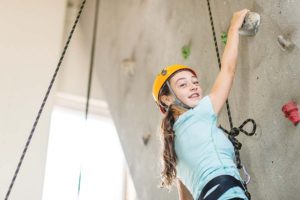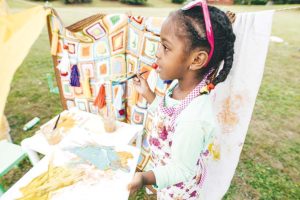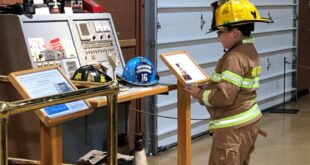The idea of summer camp can be daunting for both parents and kids, especially if a child has never been. How do you even know if your child is ready to go to camp?

Alicia Berlin, director of Camps Airy and Louise near Thurmont, says that children may be ready for camp sooner than parents realize. “Kids aren’t always going to express an interest in camp, because they themselves don’t know if they’re ready,” Berlin says. She encourages parents to tour the camp with their child the summer before so that they can talk to other campers, families and staff.
It’s also important to have conversations with the child throughout the process. Steve Cusick, assistant director of the Summer at Friends day camp in Baltimore, encourages parents to take a moment to talk through the information about camp with their child.
“They should go through details like lunch, activities, pickup and communicating with their counselor,” he says.
Parents should realize that they set the tone for camp.
“Parents really influence a child’s success at camp,” says Berlin. “That’s why it’s important to start talking about it in the offseason and to stay positive.” She warns against any kind of negative talk, because it becomes a self-fulfilling prophecy. “Parents shouldn’t be voicing their personal worries to the child, because then the child feels responsible for the parent.”

How do parents choose a camp? What kinds of camps are out there? Camps Airy (boys) and Louise (girls) are Jewish-based overnight camps that cater to grades two to 12.
“It’s a very positive environment, and we’ve found that kids are much more willing to take positive risks in a single-gender group,” Berlin says. But the camps are connected, so the girls and boys participate in activities regularly.
For an overnight camp, Berlin encourages kids to have a successful sleepover first. If they’re comfortable with that, it’s a good sign to start camp.
“A child really doesn’t know what they can do until they go away and have to figure things out for themselves,” she says. By living with 12 to 14 other children, they learn how to problem solve and communicate. “They become more independent because they’re responsible for cleaning the bunk, doing chores, choosing activities and making friends.”
What’s more, she adds, the experience helps kids form strong bonds and gives them an opportunity to re-create themselves and be who they want to be.
For children who have a passion for sports, Ramah Sports Academy is an example of what’s out there. Located at Fairfield University in Connecticut, the overnight camp focuses on high-level sports instruction and fostering a love for Judaism. “We offer three two-week sessions,” says director Rabbi Dave Levy. “Campers pick a sport before they attend, and they focus on that sport twice a day, every day.”
Open to grades four to 11, campers work with experienced coaches in their specific sport for five hours each day.

Jewish education and spiritual development are woven into daily activities, and campers have the option to switch things up and spend some additional time exploring another sport. Levy says that parents should be sure their kids are excited about the activities and are willing keep up with the routine before sending them. “Trying one of the two-week sessions helps a child get their feet wet and get a sense of whether this is something they enjoy.”
As for day camps, Summer at Friends offers numerous co-ed camps for ages 4 to 13, which is typical of day camps. Campers can choose from day programs filled with classic camp activities, such as games or arts and crafts, or camps that focus on specific interests, such as arts or technology.
“We have a half-day option for ages 4 to 5, which might be a good idea if this is the child’s first exposure away from their parents,” Cusick says. For teenagers, Summer at Friends offers babysitter training, first aid/CPR/AED training and a counselor-in-training program. Campers can easily switch programs if they decide the specific camp they chose isn’t for them. “We make it easy for them. And no matter what, they’re going to come out with new interests and new friends,” he adds.
Star Academy offers a program much different from traditional summer camps, but is another example of the offerings parents can expect. As a STEM-based training camp, campers spend their days exploring technologies and participating in engineering projects that include experience in circuitry, programming and flying drones, coding and robotics.
“We offer an engaging, educational and fun experience,” says general manager Mike Leavey. “This is a chance for kids who don’t enjoy sports or outdoor activities to explore hobbies that can be enjoyable and educational.”

The camp offers three levels: five half-days a week for children 6 to 8; half or full days for kids 9 to 12 with themes from rockets and robots to designing magic tricks; and half-day skills camps for children 12 and over who are looking to go more in depth with a topic.
“Some kids are a bit young for the program, so the question parents need to ask is, ‘Can my child read well?’” Leavey says. “The 6-to-8 group is more hands-on, but they can’t program if they can’t read.”
Tech-minded kids “find like-minded peers and feel less alone,” Leavey adds.
What’s more, they’re building valuable skills that they can’t get other places. “They’re learning 21st-century skills along with team building, problem solving and communicating,” he adds. “If we get them hooked on robotics at an early age, we might have created a future engineer.”

There are also specific camp options for children with learning differences, such as the summer camp at Odyssey School, where campers with dyslexia or other learning differences can enjoy half- and full-day options in writing and creative workshops, the benefit of a reading tutor or take part in a math workshops. Coppermine provides activities like sports, archery and team building.
“It’s a good balance of fun and academics,” says Elizabeth Bartlett, the school’s coordinator of advancement and alumni relations. “It doesn’t feel like school. They’re not in uniform, there’s no homework, and they get to see new faces.”
 Baltimore's Child Baltimore's Child
Baltimore's Child Baltimore's Child








